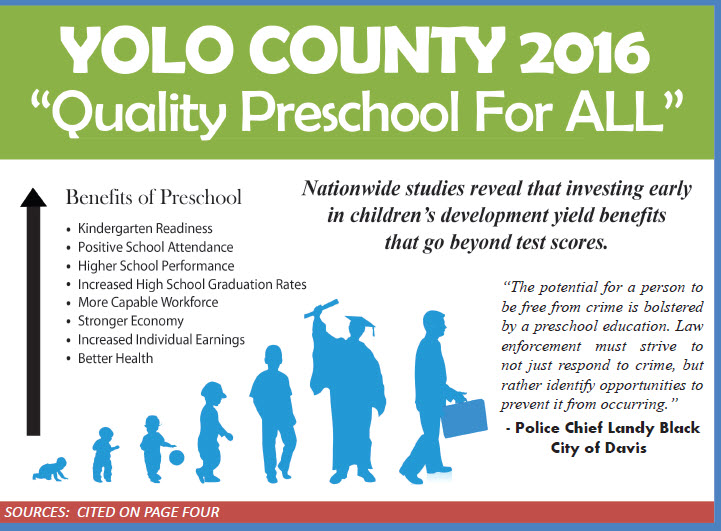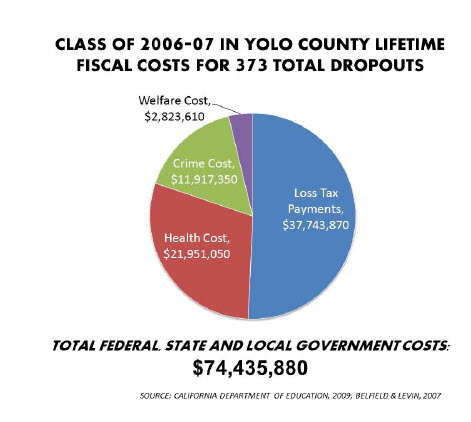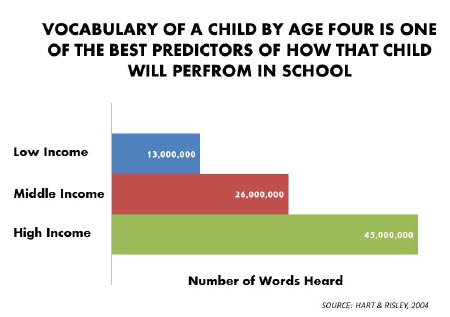
Last week in looking at factors causing the Davis school achievement gap, we cited the problem that preschool is not universally available to all students. That problem is compounded by the fact that DJUSD has no hard data on how many children are or are not attending preschool and how that impacts the achievement gap.
According to literature from the Yolo County Superintendent of Schools, Jesse Ortiz, “A school readiness gap exists for the youngest learners in Yolo County. At least 41% of three and four year olds in Yolo County do not experience preschool before starting Kindergarten. Income disparities, rural location, family mobility – all present significant lifetime challenges that could be overcome by a quality preschool for all education system. Our entire county community would benefit from this system and the resulting overall positive economic impact.”
Mr. Ortiz, along with a growing coalition of elected officials ranging from Congressman John Garamendi and Senator Lois Wolk, to Supervisors Jim Provenza and Don Saylor, down to local school board members in Davis (Barbara Archer and Madhavi Sunder), Woodland (Cirenio Rodriguez and Tico Zendejas) and West Sacramento (Norma Alcala) are pushing for a Yolo County 2016 “Quality Preschool For All” measure that provides preschool for all Yolo County kids.
The program would be modeled after the 2002 Measure K approved by West Sacramento Voters – “Universal Preschool for West Sacramento.” According to the Superintendent’s literature, “A 2014 evaluation of the program found it to be a success.”
Based on that success, “Yolo County preschool advocates propose the implementation of a quality preschool program for all children in Yolo County.”
The proposed preschool system would be one that is available to every child, regardless of family income, the child’s abilities, or other factors. Yolo County’s program would provide full-day, full-year quality preschool for all three-year-olds and eligible four-year-olds.
They write, “The adoption of preschool for all would address the current gaps in service provided by Transitional Kindergarten and preschools while ensuring that all three- and four-year-olds are ‘Kindergarten ready’ by age five.”
 “Yolo County’s program would be developed with the support of existing private and public preschool providers in the area, and would strive to complement – rather than duplicate or replace – existing programs. The program would put in place a standardized accountability system to measure teacher quality that could be expanded and replicated to area school districts,” the advocates write.
“Yolo County’s program would be developed with the support of existing private and public preschool providers in the area, and would strive to complement – rather than duplicate or replace – existing programs. The program would put in place a standardized accountability system to measure teacher quality that could be expanded and replicated to area school districts,” the advocates write.
“Yolo County preschool advocates firmly believe that all children should start Kindergarten prepared to succeed. By giving them the best possible start in life, we will ensure an educated workforce and positive economic growth far into the future.”
They continue, “Providing a full-day, full-year service to employees will enhance the area’s current offerings of affordable childcare for the workforce. Children, families, and subsequent local classes will all benefit from the additional training and professional development received by preschool providers.”
According to the literature, “A high-quality preschool education is critical to ensuring that children start Kindergarten on a level playing field with their peers. Since the 1960’s more than a hundred studies in the United States alone have shown that preschool attendance significantly benefits children’s school readiness and success. Without access to preschool, low-income children and dual language learners often start behind and stay behind as they progress through school.”
They cite research that shows that children who attend preschool are 24 percent more likely to pass reading tests through grade three, while those who do not read well by the end of third grade are four  times more likely not to complete high school.
times more likely not to complete high school.
“Programs like Head Start, while intended to expand access to preschool for low income families, have not reached large segments of the population,” they write. Last week, we noted that Head Start only reaches 450 students in Yolo County. In the meantime, “Income scales are often set too low, with the working poor and middle class ineligible altogether. In contrast, preschool-for-all programs reach all children and provide for the most efficient use of best practices, curriculum, and teacher development programs.”
According to a 2014 study, nearly 15,000 children ages 0-5 live in Yolo County. There are approximately 2,400 births annually. In 2015, an estimated 59 percent of all three- and four-year-olds in Yolo County were enrolled in a preschool program.
“Since 2008, the total number of subsidized child-care slots in Yolo County has decreased from 3,277 to 2,288 – leaving even more families without affordable, quality childcare options. The Yolo County Office of Education estimates that approximately 2,000 three and four year olds who qualify for Head Start and state-subsidized preschool are unable to find placement in these programs due to the long waiting lists,” they write.
Superintendent Ortiz notes that Measure K, the funding Mechanism for “Universal Preschool for West Sacramento,” was funded with a half cent override of the sales tax. He believes that between half a cent to a cent countywide could fund “Quality Preschool for All.”
—David M. Greenwald reporting






That could put Davis at 9 1/2 percent.
If you spent $10,000 in Davis on taxable goods, that would add $100 to your bill and allow every child in Yolo County to go to preschool.
Here you go again. A latte here, a latte there, $50 here, $100 there, $200 parcel tax here, $250 parcel tax there. All these “it’s only’s” add up to where many people are getting to the point where they can’t afford it.
You have to decide what’s most important – it’s one reason I have been reluctant to support municipal taxes when I think there are bigger needs elsewhere. Bear in mind, the down river costs of not doing this (see the chart)
BP
“All these “it’s only’s” add up to where many people are getting to the point where they can’t afford it.”
I agree that the “it’s only’s” add up. What you do not seem to see are the costs associated with not paying for early childhood education. Landy Black certainly has this right. The child who does well in school, goes on to college or a trade school is the child that won’t be stealing your electronics, bike, or car, won’t be caught and go through our very expensive legal system ( paid for with our taxes) and won’t be incarcerated ( also paid for by us). Education is a primary prevention against crime. Pay now and increase the number of productive citizens, or save a little now, and pay enormously in terms of the effects of crime, prosecution and imprisonment. Primary prevention is always less expensive.
Exactly, BP is only adding up one column, not weighing the costs of one approach versus another.
BP: Here you go again. A latte here, a latte there, $50 here, $100 there, $200 parcel tax here, $250 parcel tax there.
BP, this is an interesting comment from you. You have said that your wife teaches pre-school. I would think, possibly, that you value your wife’s profession enough to think that every kid oughta get preschool. That you might be aware of long term benefits. Maybe you don’t think so?
Or if it is important for all kids, what would you suggest as an alternative funding mechanism where money isn’t available? Low interest federal student loans for pre-school?
Adding to the already high sales tax is probably a non-starter, and I doubt there would be support from the local business community or a lot of citizens. Nor do I see pre-school as a solution to the achievement gap. Even if arguably pre-school did some good (which I highly question), it would be undone by the wacky teaching methods foisted upon teachers which totally confuse students, especially those students who do not get consistent help from parents, are slower learners, have learning disabilities or English is their second language.
I think that the various groups that want parcel and sales tax increases for their separate causes need to get together to consider the impact of having 3 – 4 measures before the voters in the same couple of election cycles. Pre-school, school parcel tax renewal, sports park, roads….
Anon: Nor do I see pre-school as a solution to the achievement gap. Even if arguably pre-school did some good (which I highly question), it would be undone by the wacky teaching methods foisted upon teachers which totally confuse students, especially those students who do not get consistent help from parents, are slower learners, have learning disabilities or English is their second language.
When you discuss the effectiveness of pre-school, you seem to focus on cognitive development — math and language competency. Studies of pre-school seem to support what you are saying, that benefits of pre-school for cognitive competency seem to disappear after a few years.
But there are other studies that show the long term effectiveness of pre-school over decades, and it seems to show trends toward better life outcomes. What you don’t account for in your criticisms are the non-cognitive benefits of pre-school and of education in general. The rationale is that pre-school better develops non-cognitive skills and outcomes — how to get along with others, how to function in a school environment, how to respond to new experiences, etc.
Do you think education in general has no value on non-cognitive skill development? do you think pre-school is worthless in this area?
Pre-school is a benefit to ‘socialization’ … that is VERY important for many kids (particularly only children) as it is for puppies/young dogs (please don’t read TOO much into that analogy!)
American Public Media, Early Lessons
….
At least Jesse Ortiz is trying to close the gap by implementing pre-school for all. I truly am impressed with his efforts, whether or not he can pull it off, at least he is trying to deal with some of this county’s most vexing educational issues. I’m really glad he won the election.
Implementing pre-school for all, in my opinion, should not be the objective… pre-school for those who need, or want it, IS a worthy objective… for those who NEED it, and can’t “afford” it, I have no problem supporting it financially, as a taxpayer. For those who cannot “afford it”, most pre-school programs in Davis have fairly low rates, financial support, but generally require parent/family participation (parent/family participation, what a concept!).
@ 4 yrs, 10 months, I was reading “Winnie the Pooh” (the REAL version, without the “Golden Book” assists)… almost got kicked out of Kindergarten because when the teacher called on me to read the “Dick and Jane” stories, I was always on the “wrong page”… was trying to figure out how the story turned out. Teacher thought I was not “kindergarten-ready”. Never went to pre-school, never needed to. My parents were HS graduates, but not beyond that. But, they cared for me.
Pre-school is definitely needed for children whose parents are not prepared to prepare their children,or for any reason (including choice). It should not be mandatory, and parents should be required to contribute their time (unless both are working at low-end jobs) and there should be a sliding-scale (based on family income) of financial contributions from the family.
All of my kids went thru pre-school (DPNS, DCCNS). We played by the rules I outlined.
NPR, 4/22/2014: Who’s Getting Preschool Right? Researchers Point To Tulsa
Oh, it will be interesting to see what VG contributors (posting) are also those who have posted re: GATE/AIM…
An alternate view on pre-school: https://mommymythbuster.wordpress.com/opinions/universal-preschool/
Quote from your article:
A fair criticism in this article, I think. That kindergarten was originally meant to prepare children, emotionally and developmentally, through play and social activities without any serious focus on traditional academic work. Now kindergarten is beginning to be viewed as the first step to math and reading instruction (see Is the Common Core killing kindergarten?), and pre-school is the opportunity for non-academic development.
I am interested in learning more about this proposal. Options for affordable preschool seem surprisingly limited even in Davis. Unfortunately, despite the apparent support from elected officials, this article seems to still be the only source of information on the proposal.